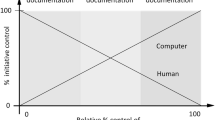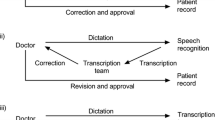Abstract
In an emerging application of speech technology, physicians speak prescription orders into wireless handheld devices that record the order using automatic speech recognition (ASR). Orders are recognized using ASR, then displayed on the screen for verification and, after checking, are relayed to the pharmacy for filling. Given the frequent opportunities for mistakes, this scenario provokes chills in many of us. Many physicians do not speak English as a native language, or they have a strongly accented variety of English.
Some drugs are familiar enough that they should not present recognition/pronunciation difficulties (e.g. aspirin, codeine). Hundreds of drug names are easily confusable; other names range from opaque to ambiguous to ‘no idea’ with regard to pronunciation.
The problems with the ‘unknowable’ drug names (the majority) are sometimes alleviated by drug manufacturers providing a ‘pronunciation hint’, in a dictionary-style phonetic transcription. This is not necessarily helpful to native or non-native speakers of English, or those unfamiliar with such renditions. More often, we are left to our own (wobbly) intuitions about stress placement, vowel length or ‘hard’ or ‘soft’ letter ‘c’, etc. Speaking the potentially infinite class of drug names correctly is an extra challenge for any TTS system.
This paper presents data for drug names in the confusable, transparent, opaque, and unknowable categories. The clear and present dangers for patients receiving the wrong drugs and for everyone using such speech-automated systems are examined.
Similar content being viewed by others
References
Andolsen, A.A. (2004). Can you understand me now? The Information Management Journal, 38(1):52–56.
Associated Press (March 13, 2004) Company invents talking chips for prescription bottles. http://www.macon.com/mld/macon/news/nation/8175551.htm
Clayton, B.D. and Stock, Y.N. (2004). Basic Pharmacology for Nurses. 13th Edn. Mosby.
Grasso, M.A. (2003). The long-term adoption of speech recognition in medical applications. In Proceedings of the 16th IEEE Symposium on Computer-Based Medical Systems (CBMS 2003), 257–262.
Henton, C. (2002). You say ‘zee’, and I say ‘zed’. Issues in localizing voice-driven applications. Speech Technology, May/June:28–31.
Henton, C. (2003). The name game: pronunciation puzzles for TTS. Speech Technology, September/October, 32–35.
HLT News. (April 1, 2004). Speaking bottles, http://www.hltcentral.org/news/index.
Hodgson, B.B. and Kizior, R.J. (2003). Saunders Nursing Drug Reference 2004. W.B. Saunders.
MBF News (March 30, 2004) Similar sounding drug names raise medication error risk. http://www.mbf.com.au/about/mediareleases/medicationrisk.html.
Nursing 2004 Drug Handbook. 24th edn., Lippincott, Springhouse Publishing Company.
Rolandi, W. (2003). When you don’t know when you don’t know. Speech Technology, July/August: 28.
Springhouse Nurse’s Drug Guide 2004. Lipincott.
Skidmore-Roth, L. (2003). Mosby’s Nursing Drug Reference. Mosby
Truss, L. (2003). Eats Shoots & Leaves. The Zero Tolerance Guide to Punctuation. London: Profile Books.
Voice of the Injured (2004). Prescription errors due to similar drug names. http://www.voiceoftheinjured.com/a-mp-similar-drug-names.html.
United States Pharmacopeial Convention, Inc.(1999). Use Caution, Avoid Confusion. U.S. Pharmacopeia Quality Review no. 76 (2001). http://www.usp.org/patientSafety/briefsArticlesReports/practitionerReportingNews/prn1122004-02-25.html.
U.S. Pharmacopeia Quality Review No. 73 (March, 2000).
U.S Pharmacopeia (2001). USP identifies more than 750 unique drug names reported to cause confusion. http://vocuspr.vocus.com/vocuspr30/xsl/uspharm/Profile.asp? Entity = PRAsset&EntityID=3139&XSL=PressRelease.
Author information
Authors and Affiliations
Corresponding author
Rights and permissions
About this article
Cite this article
Henton, C. Bitter Pills to Swallow. ASR and TTS have Drug Problems. Int J Speech Technol 8, 247–257 (2005). https://doi.org/10.1007/s10772-006-5889-0
Received:
Revised:
Accepted:
Published:
Issue Date:
DOI: https://doi.org/10.1007/s10772-006-5889-0




